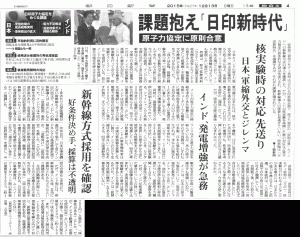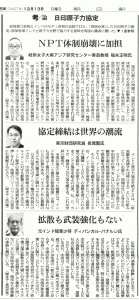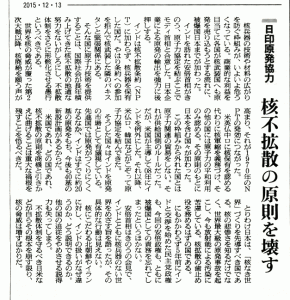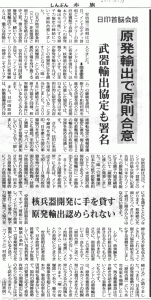Original Japanese written by staffer
The English below translated from the original Japanese by Heeday
The English translation edited by Rev. Dr. Henry French, ELCA
(Based on articles from the December 13, 2015 editions of the Asahi Shimbun and Akahata newspapers)
▼Click each image and read the caption.
Japan’s Prime Minister Shinzo Abe met his Indian counterpart, Prime Minister Modi, on December 12, 2015, and reached a “basic agreement” to sign a nuclear agreement between the two nations which would enable Japan to export both its nuclear technology and its bullet train technology to India.
A nuclear agreement permits the signing countries to im/export radioactive substances and nuclear technologies only for peaceful use. Currently, Japan has signed such an agreement with 14 countries and regions. The negotiations with India began five years ago, in 2010.
India plans to build 40 more nuclear power plants (NPPs) by 2032, and expand its NPPs’ power generation capacity to 63 million kW, more than ten times greater than what the nation has today. India has already signed a nuclear agreement with the US, France, and others. Here we have to note that all the pressure vessels of reactors from the US or France are made in Japan. Thus, in reality, unless India signs such a deal with Japan as well, its agreements with the US and France become meaningless.
Now, India has conducted nuclear bomb tests before, and it is not part of the Nuclear Non-proliferation Treaty. Many, therefore, are calling for a more cautious attitude to the India-Japan agreement, including, among others, the mayors of Hiroshima and Nagasaki who jointly petitioned to suspend the negotiations for the agreement, in that the proposed agreement “generates suspicions that the imported nuclear technologies will be used in the development of nuclear weapons.” Also, inside Japan, many are saying that “the nation should not export a NPP,” considering the disaster that the meltdown of TEPCO’s Fukushima Daiichi caused.
According to the Stockholm International Peace Research Institute (SIPRI), India owns nuclear weapons, some 90 to 110 such weapons as of January 2015. NPPs imported from Japan can help India develop more nuclear warheads. In the negotiations, Japan has been claiming the deal is compatible with the non-proliferation policy, saying that the deal lets the International Atomic energy Agency (IAEA) inspect to prevent any military use of nuclear technologies imported from Japan. Also, if India holds a nuclear bomb test, Japan will suspend its cooperation with India, says Japan. However, the IAEA is capable of inspecting only some of the nuclear facilities in India, not all of them.
Thus, no one can guarantee whether or not India is honest in its announcements.
Moreover, India has been in tension with its neighbor, Pakistan. Once the border situation changes, India might resume its nuclear bomb tests and/or expand its nuclear weapons.
Once contaminated with radioactivity, no human and no part of nature can return to a contamination-free state again. The fallout from Fukushima Daiichi and the damages caused from the fallout can harm many for ages to come, and no human can predict how many generations will be victimized. In the years to come, the meltdown might well contaminate much of the Pacific and beyond, as many fear.
Today, Japan has yet to resolve the Fukushima Daiichi catastrophe while, under pressure from some pro-nuke people inside Japan, the government eagerly attempts to sell NPPs to a country with nuclear weapons. I do believe this should not be tolerated.




